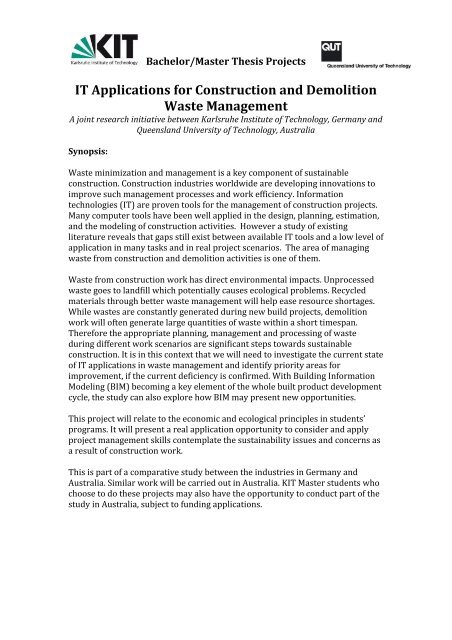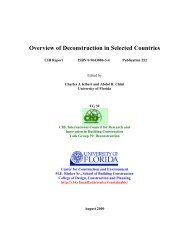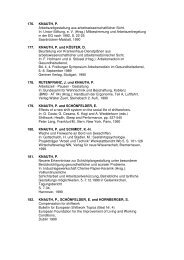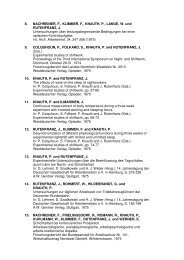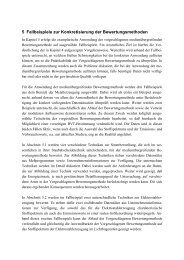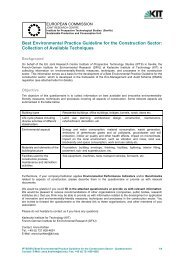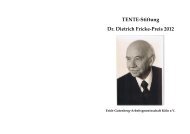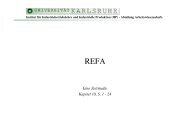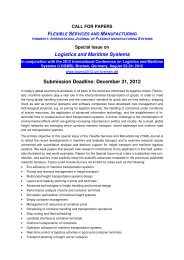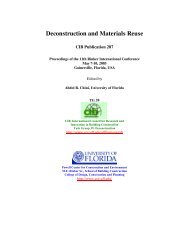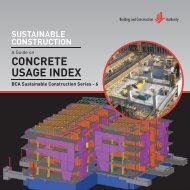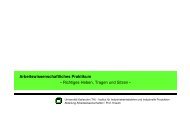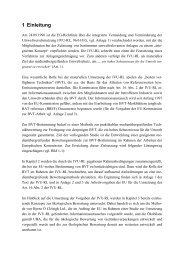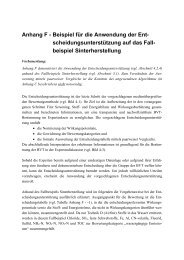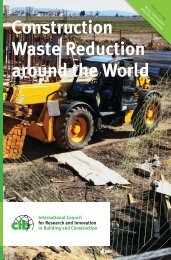IT Applications for Construction and Demolition Waste ... - IIP - KIT
IT Applications for Construction and Demolition Waste ... - IIP - KIT
IT Applications for Construction and Demolition Waste ... - IIP - KIT
You also want an ePaper? Increase the reach of your titles
YUMPU automatically turns print PDFs into web optimized ePapers that Google loves.
Bachelor/Master Thesis Projects<br />
<strong>IT</strong> <strong>Applications</strong> <strong>for</strong> <strong>Construction</strong> <strong>and</strong> <strong>Demolition</strong><br />
<strong>Waste</strong> Management<br />
A joint research initiative between Karlsruhe Institute of Technology, Germany <strong>and</strong><br />
Queensl<strong>and</strong> University of Technology, Australia<br />
Synopsis:<br />
<strong>Waste</strong> minimization <strong>and</strong> management is a key component of sustainable<br />
construction. <strong>Construction</strong> industries worldwide are developing innovations to<br />
improve such management processes <strong>and</strong> work efficiency. In<strong>for</strong>mation<br />
technologies (<strong>IT</strong>) are proven tools <strong>for</strong> the management of construction projects.<br />
Many computer tools have been well applied in the design, planning, estimation,<br />
<strong>and</strong> the modeling of construction activities. However a study of existing<br />
literature reveals that gaps still exist between available <strong>IT</strong> tools <strong>and</strong> a low level of<br />
application in many tasks <strong>and</strong> in real project scenarios. The area of managing<br />
waste from construction <strong>and</strong> demolition activities is one of them.<br />
<strong>Waste</strong> from construction work has direct environmental impacts. Unprocessed<br />
waste goes to l<strong>and</strong>fill which potentially causes ecological problems. Recycled<br />
materials through better waste management will help ease resource shortages.<br />
While wastes are constantly generated during new build projects, demolition<br />
work will often generate large quantities of waste within a short timespan.<br />
There<strong>for</strong>e the appropriate planning, management <strong>and</strong> processing of waste<br />
during different work scenarios are significant steps towards sustainable<br />
construction. It is in this context that we will need to investigate the current state<br />
of <strong>IT</strong> applications in waste management <strong>and</strong> identify priority areas <strong>for</strong><br />
improvement, if the current deficiency is confirmed. With Building In<strong>for</strong>mation<br />
Modeling (BIM) becoming a key element of the whole built product development<br />
cycle, the study can also explore how BIM may present new opportunities.<br />
This project will relate to the economic <strong>and</strong> ecological principles in students’<br />
programs. It will present a real application opportunity to consider <strong>and</strong> apply<br />
project management skills contemplate the sustainability issues <strong>and</strong> concerns as<br />
a result of construction work.<br />
This is part of a comparative study between the industries in Germany <strong>and</strong><br />
Australia. Similar work will be carried out in Australia. K<strong>IT</strong> Master students who<br />
choose to do these projects may also have the opportunity to conduct part of the<br />
study in Australia, subject to funding applications.
Requirements:<br />
Both Bachelors <strong>and</strong> Masters students can choose to carry out the projects below,<br />
with some different emphasis <strong>and</strong> requirements.<br />
For bachelor thesis, the following is required:<br />
Identify problem scope<br />
Conduct some literature study<br />
Design <strong>and</strong> develop questionnaires or interviews<br />
Conduct the interviews to collect first h<strong>and</strong> data<br />
Analyse data <strong>and</strong> present findings<br />
This needs to be completed between November 2012 <strong>and</strong> January 2013.<br />
For Master thesis, the previous bachelor problem‐setting is extended over the<br />
following aspects:<br />
Exp<strong>and</strong> literature study<br />
Identify key barriers to <strong>IT</strong> implementation <strong>and</strong> factors/areas that will<br />
promote new applications.<br />
Develop a model to optimize opportunities <strong>and</strong> reduce risks of <strong>IT</strong><br />
implementation <strong>for</strong> C&D waste management.<br />
This needs to be completed between March <strong>and</strong> May 2013.<br />
Students will need to first underst<strong>and</strong> the main processes of waste management<br />
in construction <strong>and</strong> demolition work. Guided by the supervisors, they will then<br />
study existing literature to gain the necessary underst<strong>and</strong>ing of the key<br />
constraints <strong>and</strong> potential barriers that prevent construction contractors from<br />
applying ICT tools in their operation. These issues will be categorized into major<br />
issue <strong>for</strong> further investigation.<br />
Based on this initial underst<strong>and</strong>ing, a questionnaire will be designed to survey<br />
the local industry to identify critical factors from all major issues, as in<strong>for</strong>med by<br />
the industry practitioners.<br />
Nature of survey: mailed or online questionnaire<br />
Sample/target audience: construction contractors <strong>and</strong> subcontractors<br />
Main work steps: scope identification, literature study,<br />
questionnaire design, data collection, analysis<br />
<strong>and</strong> reporting.<br />
Reporting:<br />
o A thesis covering problem background, literature, methods <strong>and</strong><br />
data collection approaches, findings <strong>and</strong> discussion.<br />
o Questionnaire design template as an appendix to the project<br />
report<br />
o Electronic submission of thesis <strong>and</strong> raw data including simple<br />
statistical analysis.<br />
For masters students only:<br />
o Presentation of research methodologies<br />
o Model/framework development
Bachelor/Master Thesis<br />
Smart Transport Infrastructure <strong>for</strong> the Future<br />
A joint research initiative between Karlsruhe Institute of Technology, Germany <strong>and</strong><br />
Queensl<strong>and</strong> University of Technology, Australia<br />
Synopsis:<br />
To many, transport infrastructure is the backbone of a nation’s economy. It also<br />
services the needs of our society. Railway stations <strong>and</strong> bus terminals are unique<br />
parts of this infrastructure. They are where buildings <strong>and</strong> transportation<br />
facilities connect through people – the commuters <strong>and</strong> passengers. They need to<br />
function well to meet the dem<strong>and</strong>s of everyday users, while delivering the<br />
operational efficiency <strong>and</strong> productivity <strong>for</strong> organizations that are managing<br />
them. Often nestled into a service hub with shops <strong>and</strong> restaurants inside <strong>and</strong><br />
hotels nearby, these unique infrastructures also interact with the neighborhood<br />
<strong>and</strong> local economy.<br />
When stations <strong>and</strong> terminals become older <strong>and</strong> obsolete, they cannot not cope<br />
with new <strong>and</strong> emerging challenges. These challenges can range from alternative<br />
transport patterns, multi‐modal transit systems, new user dem<strong>and</strong>s, use of smart<br />
technologies, the energy efficiency requirements, <strong>and</strong> the changing service needs<br />
of local community. If left unattended, the aging infrastructure may cause serious<br />
economical <strong>and</strong> ecological problems. However, redeveloping railway stations<br />
<strong>and</strong> bus terminals are far beyond simple redecorations <strong>and</strong> repainting. Many<br />
considerations on social, economical, <strong>and</strong> environmental constraints <strong>and</strong><br />
priorities need to be made. New technologies may need to be introduced <strong>and</strong><br />
sustainability principles should be followed. It may also require physical<br />
rebuilding, which brings about design, construction, urban planning, service<br />
interruption <strong>and</strong> waste management issues. These facilities often involve<br />
multiple stakeholders thus any decision on the redevelopment of these facilities<br />
needs to be made on a consultative <strong>and</strong> multi‐criteria basis. But making them<br />
smart <strong>and</strong> sustainable will be an important agenda.<br />
In the course of the thesis, current issues <strong>and</strong> decision‐making patterns<br />
surrounding the redevelopment of aging <strong>and</strong> obsolete railway stations <strong>and</strong> bus<br />
terminals shall be identified. Students will need to follow principles of<br />
economics, project management, organizational <strong>and</strong> optimization theory, <strong>and</strong><br />
sustainability to identify, investigate <strong>and</strong> explore the problems be<strong>for</strong>e presenting<br />
findings in their reports. The collective in<strong>for</strong>mation <strong>and</strong> recommendations<br />
stemming from the projects will help raise the awareness <strong>and</strong> promote best<br />
practices among authorities <strong>and</strong> industry practitioners such as Deutsche Bahn<br />
<strong>and</strong> KVV.<br />
This work is part of a comparative study between the industries in Germany <strong>and</strong><br />
Australia. Similar work will be carried out in Australia. K<strong>IT</strong> Master students who
choose to do these projects may also have the opportunity to conduct part of the<br />
study in Australia, subject to funding applications.<br />
Requirements:<br />
Both Bachelors <strong>and</strong> Masters students can choose to carry out the projects below,<br />
with some different emphasis <strong>and</strong> requirements.<br />
For bachelor thesis, the following is required:<br />
Identify problem scope<br />
Conduct some literature study<br />
Design <strong>and</strong> develop questionnaires or interviews<br />
Conduct the interviews to collect first h<strong>and</strong> data<br />
Analyse data <strong>and</strong> present findings<br />
This needs to be completed between November 2012 <strong>and</strong> January 2013.<br />
For Master thesis, the previous bachelor problem‐setting is extended over the<br />
following aspects:<br />
Exp<strong>and</strong> literature review<br />
Identify key issues of redeveloping aged facilities into new smart<br />
transport infrastructure<br />
Develop decision support models or frameworks using business<br />
engineering principles <strong>and</strong> theories.<br />
This needs to be completed between March <strong>and</strong> May 2013.<br />
The overall investigation can be undertaken through three interrelated projects<br />
each focusing on a specific element. The students should also consult with their<br />
supervisors <strong>for</strong> guidance <strong>and</strong> confirmation of work to be carried out.<br />
Thesis 1 – Assessment of current <strong>and</strong> emerging needs of commuters, passengers<br />
<strong>and</strong> local business operators in railway stations, bus terminals <strong>and</strong> other<br />
transport infrastructure settings.<br />
Method: Questionnaire survey (mailed, fact‐to face, or on‐line)<br />
Sample/target audience: commuters <strong>and</strong> local business owners<br />
Main work steps: scoping <strong>and</strong> literature study, drafting of questions,<br />
questionnaire design, data collection, data analysis <strong>and</strong> reporting.<br />
Reporting:<br />
o The thesis covering problem background, literature, methods <strong>and</strong><br />
data collection approaches, findings <strong>and</strong> discussion.<br />
o Questionnaire design template as an appendix to the thesis<br />
o Electronic submission of thesis <strong>and</strong> raw data including simple<br />
statistical analysis.<br />
For masters students only:<br />
o Presentation of research methodologies <strong>and</strong> results<br />
o Model/framework development<br />
Thesis 2 – Exploration of problems <strong>and</strong> deficiencies of existing railway stations<br />
<strong>and</strong> bus terminals, particularly of those older facilities.
Method: Semi‐structured interviews to identify current problems <strong>and</strong> key<br />
issues, <strong>for</strong> example, any passenger inconvenience <strong>and</strong> complaints about<br />
aging facility; excessive energy consumption, maintenance issues,<br />
inability to adapt to smart technologies <strong>and</strong> new service st<strong>and</strong>ards.<br />
Sample/target audience: commuters, federal, state <strong>and</strong> local transport<br />
authorities; service providers, operators <strong>and</strong> developers of railway<br />
buildings, stations <strong>and</strong> other facilities.<br />
Main work steps: literature <strong>and</strong> scoping study, identification of potential<br />
issues, interview structure design, data collection <strong>and</strong> analysis, report of<br />
findings.<br />
Thesis:<br />
o The thesis shall cover the problem background, literature,<br />
methods <strong>and</strong> data collection approaches, findings <strong>and</strong> discussion.<br />
o Interview design as an appendix to the thesis<br />
o Electronic submission of thesis <strong>and</strong> raw data (e.g. recordings) <strong>and</strong><br />
transcribed in<strong>for</strong>mation.<br />
For masters students only:<br />
o Presentation of research methodologies <strong>and</strong> results<br />
o Model/framework development<br />
Thesis 3 – Identification of decision process, policies <strong>and</strong> work planning <strong>for</strong> aging<br />
transport infrastructure redevelopment<br />
Method: Workshops or face‐to‐face interviews to identify perceptions <strong>and</strong><br />
real experiences on the redevelopment<br />
Sample/target audience: Federal, state <strong>and</strong> city/township authorities<br />
Main work steps: literature study <strong>and</strong> issue identification, interview<br />
framework development, interview conduct, data analysis, compilation of<br />
results, <strong>and</strong> reporting.<br />
Thesis:<br />
o The thesis shall cover the problem background, literature,<br />
methods <strong>and</strong> data collection approaches, findings <strong>and</strong> discussion.<br />
o Interview design as an appendix to the thesis.<br />
o A list of interviewees <strong>and</strong> their organisations.<br />
o Electronic submission of thesis <strong>and</strong> raw data (e.g. recordings) <strong>and</strong><br />
transcribed in<strong>for</strong>mation.<br />
For masters students only:<br />
o Presentation of research methodologies <strong>and</strong> results<br />
o Model/framework development


